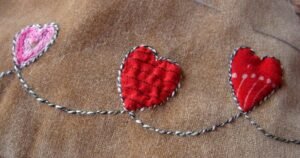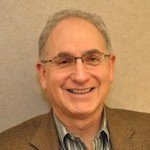Five years ago, my wife fell in love. I’m not talking about me (we have been married thirty-nine years, so I hope the falling in love thing happened much earlier). Through her genealogy research, my wife, Vicki, discovered a ninety-three-year-old cousin living on her own in Montreal.
Vicki’s research started with one item that she found among her late parents’ belongings: a postcard, sent from Poland and written in Yiddish, that had been addressed to her paternal great-grandfather. This was her first inkling that she might have family that had not emigrated to the United States in the 1880s. Vicki’s father loved talking about his extended family and their quirks, their triumphs, their heartbreaks. An ordinary family but, in his mind, worthy of treatment as saga. But he had never mentioned that part of the family had remained in Europe and had probably been eye-witnesses to the Holocaust. Vicki’s research began with finding a Yiddish speaker who could translate the postcard, researching the names of the senders, and eventually discovering that her great-grandfather was the only one of ten siblings to emigrate to the U.S.—leading her to wonder what became of her family that had remained in Europe?
Thanks to contemporary record keeping and digital archives, and to Vicki’s inability to let go of something once it piques her passion, she unearthed evidence of not a handful, not tens and not hundreds, but thousands of relatives: those who perished in or survived the Holocaust and their descendants, who now populate the diaspora in the U.S., Canada, Panama, Argentina, Israel and Sweden. It was like pricking a balloon, swollen with water, that gushed forth a flood. One relative informed her that her cousin Lucy (not her real name) in Montreal was related to Vicki’s great-grandfather and had been searching for years for any of his descendants. Isolated, and lacking a certain degree of technological proficiency, all she could do was wait.
For our first visit to Montreal to see Lucy, another cousin whom Vicki had unearthed, Artie (again, not his real name), flew up to join us. Lucy had set her modest table with her finest cut-glass serving bowls, and platters of meats, cheeses, breads, pickles, fruits and sweets. Lucy is a tiny woman who emits a bold presence. A wide smile, framed with bright orange lipstick, with short, fashionably-styled blond hair. Gregarious and loquacious. Eyes that really look at you when she speaks. Wearing a bright orange blazer over a shiny white satin blouse, she could not possibly fade into the background. To say Lucy was ebullient would be an understatement. It was like a homecoming—a “reunion”—in that it felt so familiar—but of souls who had never actually met.
Vicki, Artie and Lucy delved into their shared family history, a map of their mutual landscapes that had led to that moment. Lucy recounted her childhood in the Lodz ghetto in Poland, where Jews were forced to live—stripped of their property, freedom and dignity—before confronting their ultimate fate, the deaths of her grandmother and father at the hands of the Nazis, her survival in Auschwitz and Ravensbrück, and her displacement after the war to Sweden and Canada. She did this with no rising emotion, no tears, no flashes of rage. She was simply telling her story in the safety and warmth of her family, whom she had only recently discovered but whom she knew would provide a haven.
Psychiatrists Allan Schore (Affect Dysregulation and Disorders of the Self) and John Bowlby (Attachment and Loss) showed us that our brains function as part of an interdependent system with other brains; our brains evolved to connect with others and these connections are essential for our emotional and cognitive functioning. The neuroscientist and philosopher Andy Clark (Mindware) further expanded this notion that our brains are not stand-alone organs; we must consider other brains, which help us know and understand the world, as parts of our own mental apparatus. We, as living beings, do not stop at the surface of our skin. Relationships change our brains and are necessary for our brains, and for us, to survive.
Vicki’s explorations continued into her genealogy, and then into the history and the literature of the Holocaust, both nonfiction, like The Lost: A Search for Six of the Six Million by Daniel Mendelsohn, and fiction, like The Tattooist of Auschwitz by Heather Morris, to experience how these stories were told—gathering information for what she hopes will be the book that she writes to honor the memories of those who perished and those who survived. This alchemist’s mix of human connection and literature has transformed Vicki. The woman who, to me, was already profoundly connected to others, has found depths within herself and others that I had not seen before.
Literature provides us a portal to relating to ourselves and others in a fuller way. Literature becomes alive and essential when it connects us with others and, thusly, with our humanity, the richness of our existence, and any superordinate plane of existence that might be out there. In this way, the interplay of literature and relationships creates emergent properties that become as much a part of us as the blood, the sinews and the neurons on the inside of what we imagine is the boundary of our skin.
That is what Vicki is exploring: that liminal space where literature, history and relationships—the aesthetic, the scholarly and the personal—coalesce, and humanity emerges.


Share this post with your friends.


Beautifully written essay through which we learn of Vicky’s passion to uncover more about her long-lost relative which opened the door for a greater exploration of her ancestry. Also, the explanation of how our brains are connected is fascinating!